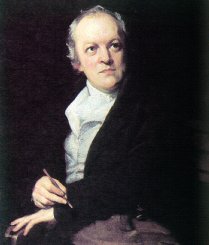 William Blake was a complex person, with a subtle and intricate perception of life. Sometimes his words are crystal clear and sometimes they are almost incomprehensible. He often wrote with symbolism, allegory and other poetic images. Blake did not apologise for the broad scope of his work or for any difficulty someone else might have with it. Indeed, in a letter to a critic he wrote:
William Blake was a complex person, with a subtle and intricate perception of life. Sometimes his words are crystal clear and sometimes they are almost incomprehensible. He often wrote with symbolism, allegory and other poetic images. Blake did not apologise for the broad scope of his work or for any difficulty someone else might have with it. Indeed, in a letter to a critic he wrote:"But you ought to know that What is Grand is necessarily obscure to Weak men. That which can be made Explicit to the Idiot is not worth my care."
Blake was often surrounded by controversy for his opinions and even for his artistic work, because he did not follow traditional styles and methods. He developed new techniques for printing and for colouring texts and images. He also painted in watercolour and tempera, disapproving of oil painting. Most of his earnings were from engraving. He occasionally printed from woodcuts.
Artistic work for which Blake received commissions was often of religious or philosophical nature and particularly Biblical. Earning a living was sometimes difficult for Blake, but as a totally optimistic workaholic he took most things in his stride, including bouts of serious ill health.
Blake's reputation among both scholars and the general public is now growing in leaps and bounds. In his own times, however, he was rarely treated with due respect. A man ahead of his time, he had great understanding and direct perception of the Spiritual dimension. He had no reservations about describing the essentially Divine nature of humankind or discussing his own status. But he had no affection for organised religions or for organised Christianity in particular.
He was keenly aware of the artistic and philosophical works of his peers and predecessors. He was a prolific producer of notes, sketches and written correspondence and of comments on other people's art work or philosophy. While often outspoken and unsympathetic, he was a sincere and affectionate friend.
Dates
- Born in London on the 28th of November 1757.
- His early art training took place at home.
- 1768-1772 Studied at Par's Drawing School in central London. It was near the River Thames and a walk away from the Royal Academy.
- 1772-1779 Apprenticed as an Engraver under James Basire, near Lincoln's Inn Fields, London.
- 1779 Began study under G.M.Moser at the Royal Academy.
- 1782 Married Catherine Boucher, from Battersea, London. He helped to educate his wife and she helped him with his printing work.
- 1827 He died on the 12th August. Catherine Blake died four years later.
Extracts from a letter to William Hayley, October 7, 1803

"Art in London flourishes. Engravers in particular are wanted. Every Engraver turns away work that he cannot execute from his superabundant Employment. Yet no one brings work to me. I am content that it shall be so as long as God pleases."
"...Yet I laugh & sing, for if on Earth neglected I am in heaven a Prince among Princes, & even on Earth beloved by the Good as a Good man."
"...for as Man liveth not by bread alone, I shall live altho' I should want bread- nothing is necessary to me but to do my duty & to rejoice in the exceeding joy that is always poured out on my Spirit, to pray that my friends & you above the rest may be partakers of the joy that the world cannot conceive, that you may still be replenish'd with the same & be as you always have been, a glorious & triumphant Dweller in immortality."
"...some say that Happiness is not Good for Mortals, & they ought to be answer'd that sorrow is not fit for Immortals & is utterly useless to any one; a blight never does good to a tree, & if a blight kill not a tree but it still bear fruit, let none say that the fruit was in consequence of the blight."
